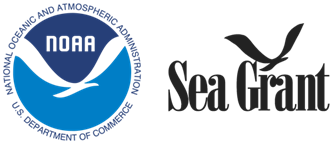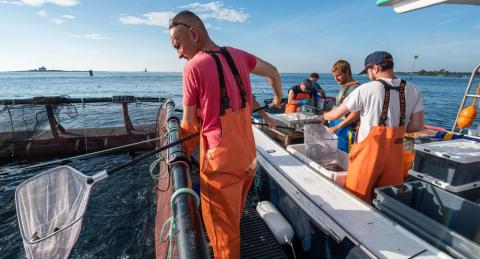
Please join the University of New Hampshire for a 10-part learning series on integrated multi-trophic aquaculture (IMTA) approaches in the Gulf of Maine.
Spring Series Format
Each 1-hour session was presented via Zoom (virtual/online). Expert speakers discussed different aspects of IMTA farming – from site permitting to harvest of seafood products to the economics of the business. Q&A encouraged.
| Date |
Session |
|---|---|
| March 22 | Introduction to the learning module series and overview of IMTA |
| March 24 |
Permitting in New Hampshire, Massachusetts, and Maine |
| March 29 |
Site selection and interfacing with local community and fisherman |
| March 31 | System design, construction, and deployment |
| April 5 | Trout transfer, stocking, and feeding |
| April 7 | Mussel and kelp aquaculture |
| April 12 | IMTA System maintenance and environmental monitoring |
| April 14 | Harvest and processing of trout, kelp, and mussels |
| April 19 | Marketing and sales of IMTA products |
| April 21 | IMTA economics and next steps |
Stay tuned for future learning opportunities.
More about IMTA
Researchers at the University of New Hampshire have been developing integrated multi-trophic aquaculture (IMTA) approaches for steelhead trout (Oncorhynchus mykiss), blue mussels (Mytilus edulis), and sugar kelp (Saccharina latissima) on a nearshore, floating platform since 2010. In this aquaculture system, the shellfish and seaweed species are suspended around the fish nets, which hang from the inside of the floating platform structure. Shellfish and seaweed bio-extract nutrients generated from the fish to reduce Nitrogen and Phosphorus input to the surrounding marine environment. The additional species provides extra income to the farmer and better utilizes the entire culture space.
In 2018, NOAA’s National Sea Grant Office awarded UNH research funds to further develop the IMTA system into what we now call the AquaFort. This uniquely engineered system is robust and can withstand 4 m (13 ft) waves, strong currents, and culture the three species together in a semi-protected site. Recent research results suggest a winter grow-out of the steelhead trout from 150g to 2kg can be obtained in 9 months with survival rates of 87% and a feed conversion ratio (FCR) of 1.2:1. Economics of the system are underway and will be shared with fishing/aquaculture industry members, students, and entrepreneurs that may have interest in this new technology.
Additional Information
Funding Acknowledgement
Funding for the AquaFort research project was awarded to New Hampshire Sea Grant (PI: Michael Chambers, Ph.D.) through the National Oceanic and Atmospheric Administration (NOAA)’s National Sea Grant Office as part of the 2018 Aquaculture Research Awards.

